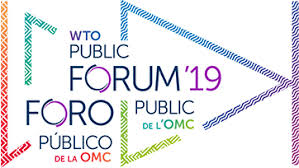Construction of a digital industrial path for Africa: What is the role of the youth?
9 Oct 2019 02:00h
Event report
[Read more session reports from WTO Public Forum 2019]
In his introductory remarks, Mr Arndt Hopfmann (Senior Advisor on Economic and Trade Policies, Rosa Luxemburg Stiftung) first noted the interchangeable nature of the challenges facing the digital economy in Africa and reminded the audience that the challenge is applicable to other parts of the world. He then briefly introduced the history of development in Africa since the 1960s, during which the United Nations Conference on Trade and Development (UNCTAD) was established, and the industrialisation became the core of development in Africa. Nowadays, the focus is shifted as the landscape of the global economy has increasingly changed due to the emergence of digital technology. He said that this shift has impacted the job market globally and in particular the youth in Africa, as they are anxious about job shortage due to the advancement of technology.
Ms Vahini Naidu (Deputy Director, International Trade Negotiations, Department of Trade and Industry, South Africa), in her keynote speech, explained what the ongoing digital trade negotiation on e-commerce at the WTO means to African countries. By recalling the Agreement on Trade-Related Aspects of Intellectual Property Rights (TRIPS), Naidu said she is concerned that the WTO negotiation on e-commerce would be another developed nation-centric trade regime that constraints the development of less affluent states. She elaborated that it seems premature for African nations to join the negotiation as less than a quarter of the population in the African continent has access to the Internet. The question African nations need to consider is who benefits from the trade agreement on e-commerce when companies from the USA and China dominate the global digital economy market.
Mr Yorgos Altintzis (Economic and Social Policy Officer, International Trade Union Confederation) shared his concern with Naidu as to where African countries would fit in if they decided to be a part of the trade agreement. He suggested that what the African Internet ecosystem needs is infrastructure upgrade, institutional development for data security, skills for labour and financing digital development, as well as state support. Without these developments in place, he alarms, Africa could end up being a physical body that receives orders from the brain (i.e. tech giants). Furthermore, he highlighted that the international community first needs to establish the data governance framework before it can move onto discussions at the WTO on cross-border e-commerce.
Ms Jane Nalunga (Country Director, Southern and Eastern African Trade Information and Negotiations Institute) explained two major issues for Africa related to the digital economy: what is the role of the youth in the construction of digitalisation?; and what needs to be in place for digital industrialisation strategy to work? Nalunga first mentioned the reality of African youth, where 60% of people under 25 are jobless. In response to this, for the youth to secure employment in the digitalised economy, developing innovation hubs that train young people on digital skills plays a key role. When youth have digital literacy and skills, their voice can be involved in policy discussion at the national, regional, continental, and international level. Nalunga highlighted that the youth are the future leaders of Africa and will lead policy negotiations on the digital economy if education and training are provided.
Mr Martin Munu (Former Research Analyst, Economic Policy Research Centre, Uganda) recognised the efforts to promote the digital economy in Africa. For instance, the African Union developed the digital strategy to respond to the digitalisation around the globe. He highlighted the need for Africa to develop readiness on the digital economy and include the youth into the development process. As a part of the effort, he mentioned that the innovation hubs need to focus on training the youth to be developers rather than consumers of the digital economy. Education on digital skills can accelerate the process of readiness development in Africa. Moreover, he introduced positive news that Mara Phones, a company in Rwanda, announced the launch of first smartphones. He elaborated that supportive policy environment is important for African tech companies to expand their business.
Related topics
Related event

